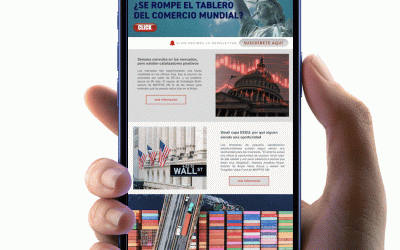“We integrate an ESG perspective into every financial product we manage”

Redacción Mapfre
Published in FundsPeople on 02/26/2024
Integrating sustainability into investment processes is a task filled with challenges, such as adapting to regulations that are constantly evolving, designing a robust methodology, addressing the data reliability problem, and communicating effectively with the managers and other company areas, just to name a few. FundsPeople is learning more about the sustainable investment teams at Spanish investment management firms, through a series of interviews with those teams and their leaders. The latest interview in this series is with MAPFRE AM, a 2024 FundsPeople Awards finalist in the category of Best Sustainability Team for a Spanish management firm.
Transversal management
Raquel Arteaga is head of the Financial Risk and Sustainability area at MAPFRE AM, which manages mutual funds, pension funds, voluntary social benefit entities (EPSVs in Spanish), and investment portfolios for clients outside the MAPFRE Group (approx. €10 billion), as well as about 70% of the insurance portfolios of that group’s companies (approx. €26 billion). “Our strategy is very closely aligned with the group’s strategy, and this includes our social and environmental commitments,” she explains.
The management of sustainability is entirely transversal: “We integrate sustainability criteria into all of the products we manage, except for some discretionary management scenarios where those criteria aren’t included in the mandate.”
Sustainable funds
MAPFRE AM’s range of funds includes two products that comply with article 8 of the European Union’s Sustainable Finance Disclosure Regulation (SFDR): Mapfre Capital Responsable, launched in 2018 (which has the FundsPeople 2024 Rating), and Mapfre Inclusión Responsable, launched in 2019, both by the firm’s French partner La Financière Responsable. In 2017, MAPFRE acquired a 25% stake in that firm, before increasing it last year to 51%.
Both of those funds were launched using the methodology applied by that well-known manager specialized in sustainable investment, and they have both received the highly demanding “ISR” label from France’s Ministry of Finance. Among other requirements, funds with that label must pass an annual audit, which covers all contractual and post-contractual information, the management and control process, all associated reports, and the marketing approach applied.
The rest of the products
All of MAPFRE AM’s other products also incorporate best-in-class scoring criteria, with a very clear commitment to exclusions based on environmental and social aspects. As Ms. Arteaga explains, “our firm wanted to take things step-by-step until the European regulations had been fully clarified, and thanks to that approach, it only takes a simple legal procedure now to transform article 6 funds to article 8 or 9, because most of the work has already been done.”
In terms of alternative funds, the firm also has an article 9 fund that invests in biomethane. That fund, known as Mapfre Inversiones Renovables II, FCR, is managed by MAPFRE’s corporate investments office. A first closing has already occurred, with the objective of capturing a total of €100 million.
PIAS and engagement
Last year, MAPFRE AM took on a commitment to identifying Systematic Individual Savings Plans (PIAS in Spanish) at the institution level, and that analysis helped identify them at the product level too. “We’ve already been indirectly incorporating many of the requirements from the sustainability legislation. Engagement is a fundamental tool that lets us have an influence on the companies we invest in. In this way, MAPFRE AM is exercising its fiduciary duties in a responsible way, and this includes voting all of our portfolio shares, which is in fact our primary means of engagement with those companies,” she says.
Since the firm takes a transversal approach to sustainability, rather than concentrating all of those efforts in just one place, it realized that there was a need to establish working groups as a forum for exchanging ideas, and to help define more robust and comprehensive processes. “That group works on establishing the bases for our engagement policies and processes (voting and dialogue), and it also works on identifying the companies we want to interact with, coordinating the process with the specialists in charge of those matters at each company. This involves making decisions about the companies where we can have a stronger impact, and where we can exert some leverage in terms of more collective initiatives,” she explains. For this reason, the investment team is responsible for initiating the dialogue and voting activities, with the risk area then overseeing compliance with the criteria established in the internal policies.
Methodology, data, and strategy
The firm also has a working group on methodology, which has been conceived in a similar way. “We created that group to work on adjusting the five products that we’re going to transform into article 8 funds. Most of its members are people from the risk and investments teams. We wanted to put together some very clear guidelines that we could use as the basis for defining our alignment with the legislation,” she explains.
MAPFRE AM uses MSCI as a database provider, although it would like to see companies offering more information, especially about the EU Taxonomy. The firm especially uses those data for companies because they have their own approach for sovereign funds, although it might still consider adding another provider. “The strategy can be defined as best-in-class, but at the same time very demanding, because we restrict our selections to the upper range of the leading companies,” she points out.
MAPFRE has been a signatory of the Principles for Responsible Investment (PRI) since 2017, and it joined the Net-Zero Asset Owners Alliance (NZAOA) in 2023. Now in 2024, new mid-range objectives have been established, focused on three pillars: reduction of emissions (43% for 2030), engagement processes (engagement with at least the top 20 portfolio companies), and investment in products that support the energy transition, whether this means bonds, products like the firm’s biomethane fund, or other options.
Challenges
When asked about the challenges MAPFRE AM is still facing in relation to sustainability, Arteaga says that “our greatest challenge is launching new products that can contribute to a more just and sustainable economy. On the one hand, we’re going to have transformations, and on the other hand, new products.” The French version of the Inclusión Responsable fund is already article 9. “For that product, an exhaustive analysis is performed regarding how the companies are fostering and supporting inclusion for people with disabilities. Our objective is to also transform the Spanish version into an article 9 fund,” she explains. In fact, that fund is now the focus of an initiative at MAPFRE where an annual award is given to the portfolio company most committed to inclusion (with the winners so far including Iberdrola, Michelin, and BNP Paribas).
Regulatory compliance is another challenge. “Consultation regarding the SFDR can require new changes,” she says, before also mentioning the challenge related to data. “We wish we had more data available, and higher-quality data. The problem is that many companies are still not reporting, but the regulations require reported information, rather than estimates,” she explains.
The importance of training
When asked about how the firm’s clients are responding, she says the responses are diverse: on the one hand, there has been proven interest from the company MAPFRE itself and other institutional investors. “But on the other hand, at the more retail level, we still haven’t seen a great deal of demand in terms of asset management,” she explains.
To conclude the interview, Ms. Arteaga says that she’d like to emphasize the efforts her company has been making in relation to training: “Our investments team and risk team, as well as our regulatory compliance team and our entire institutional sales team, have obtained CESGA certification, or are now working on it, and this is something we’re also encouraging for the rest of the employees.”



